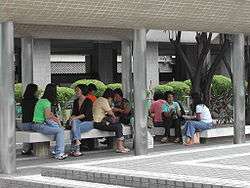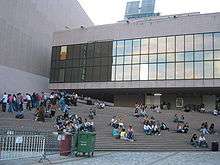Filipinos in Hong Kong
Filipinos constitute the largest ethnic minority in Hong Kong, numbering approximately 130,000,[2] many of whom work as foreign domestic helpers.[3]
| Demographics and culture of Hong Kong |
|---|
| Demographics |
|
| Culture |
| Other Hong Kong topics |
| Part of a series on |
| Ethnicity in Hong Kong |
|---|
| Total population | |
|---|---|
| 140,000 1.95% of Hong Kong's population | |
| Regions with significant populations | |
| Wan Chai District[1] | |
| Languages | |
| English, Cantonese, Filipino | |
| Religion | |
| Christianity (Roman Catholic) |
Professionals and residents
Although Filipino domestic workers outnumber other Filipinos in other professions, there are a notable number of Filipino professionals in Hong Kong. Some are architects and civil engineers, working on some of the more prominent buildings and construction projects in Hong Kong. Some are information technology professionals, and some are in professional services (accounting, culinary, dentistry, design, finance, law, music, pastoral ministry ) too. A significant proportion of those employed as domestic workers in Hong Kong have other professions in the Philippines, even those with university degrees work in Hong Kong because of better financial opportunities.[4]
The first Filipinos to have worked professionally in Hong Kong were these groups who went to Hong Kong during the post-World War II years and following the fall of the Mainland to the Communists in 1949. Many Filipinos also work in service industries in the Central business district, and also in Hong Kong Disneyland as entertainers or other cast members.[4]
Eastern District has the highest concentration of Filipino residents of any district in Hong Kong, with 3.24% of the district's population being of Filipino descent (14,596 people).[5]
Language
Most Filipinos in Hong Kong communicate with the local population in English (usually a second language for both parties). However, they communicate with their own friends and community in Tagalog or in another Philippine language. Most of them have also picked up a few Cantonese phrases in everyday life. A few are adept at Cantonese usage.
Filipinos haven't settled long enough in Hong Kong to have a large number who know Cantonese fluently, unlike some of the other ethnic minorities such as the Pakistanis and the Indians who often speak Cantonese as well as their Chinese neighbours. This is because most Filipino workers are transients who do not intend to settle in Hong Kong—each year, a large number of these leave Hong Kong permanently, to be replaced by a different set of Filipinos who have to learn Cantonese from the beginning.
Community life


Commerce
The World-Wide House arcade in Central is popular with the Filipinos, as many of the shops inside the building are run by Filipinos. The wide assortment of typically small shops caters to their needs, selling telecommunications and banking services, to food, and magazines.
Entertainment
On Sundays, one can usually encounter a large number of Filipino maids gathered at various spots in Central, including the ground floor of the HSBC Hong Kong headquarters building. Many maids in Hong Kong have Sunday as their fixed once-a-week working day off, during which they socialise, eat self-prepared food, sing, and even sell various items. This weekly gathering is such a long-standing practice that the "No Littering" signs in the vicinity are written in three languages: Chinese, English and Tagalog.
Religion
Most Filipinos in Hong Kong are Christians, the majority Roman Catholic. There are also a sizable number who congregate in Protestant and non-denominational churches. A minority are Muslims or Buddhists. Many spend at least a part of their Sunday mornings attending Mass and various church services. Numerous Catholic parishes in Hong Kong offer Masses in Tagalog or English geared towards the Filipinos. According to the Roman Catholic Diocese of Hong Kong (2011), there is an estimated 120,000 Filipino Catholics who make up a large part of the non-local parish membership.[6]
Aside from the Catholics, there are significant congregations of Filipino Protestants who attend services in Baptist, Methodist and Presbyterian churches. There is also a full fellowship of Aglipayans or members of the Iglesia Filipina Independiente (Philippine Independent Church) that attend mass at the St John's Cathedral in Central, an Anglican church. Rev. Fr. Dwight Dela Torre is the resident Filipino chaplain. [7]
In past 30 years, Filipino evangelical Christians grew drastically in numbers especially with such fellowship as the Jesus is Lord (JIL) which number in the tens of thousands.[8]
Notable people
See also
- Vallejos v. Commissioner of Registration, a Filipina maid's right of abode case
- Comilang v. Commissioner of Registration, a visa denial case by a Filipina maid with a Hong Kong permanent resident daughter
References
- District Profiles, Hong Kong Census, 2011, retrieved 27 September 2013
- mentioned in review "My Filipino one and only" Reese Deveaux Archived 29 June 2011 at the Wayback Machine The Standard, 18 September 2004
- Chu, Kathy (16 November 2013). "Hong Kong's Filipino Community Reaches Out to Typhoon Survivors". Wall Street Journal. Retrieved 11 November 2013.
- Odine de Guzman (October 2003). "Overseas Filipino Workers, Labor Circulation in Southeast Asia, and the (Mis)management of Overseas Migration Programs". Kyoto Review of Southeast Asia (4). Archived from the original on 4 May 2007. Retrieved 18 March 2007.
- 2011 Population Census IDDS Report, Hong Kong Census
- HKCSO (2011) Statistics of the Diocese of Hong Kong, 31 August, [Online], Available: "Archived copy". Archived from the original on 2 January 2014. Retrieved 13 February 2017.CS1 maint: archived copy as title (link). Accessed 12 June 2012.
- News, Team (15 August 2013). "IFI Hong Kong Celebrates Church's 111th Anniversary". HKPinoyTV. HKPinoyTV. Retrieved 15 August 2013.
- Video, Team (10 July 2015). "Thousands celebrate Jesus is Lord (JIL) Hong Kong 30th anniversary". HKPinoyTV. HKPinoyTV. Retrieved 10 July 2015.
External links
| Wikimedia Commons has media related to People from the Philippines in Hong Kong. |
- HK FILCOM Celebrates 117th Philippine Independence Day, HKPinoyTV News
- Dinagyang Festival at the Hong Kong Chinese New Year Parade 2016, HKPinoyTV News
- MassKara Festival at the Chinese New Year celebration in Hong Kong, HKPinoyTV News
- Thousands celebrate Jesus is Lord (JIL) Hong Kong 30th anniversary, HKPinoyTV News
- Filipino Catholics in HK celebrate canonization of St. Pedro Calungsod, HKPinoyTV News
- Parade and street dance at the 115th Philippine Independence Day celebration, HKPinoyTV News
- Filipino children’s choir wins gold and silver at international chorale competition, HKPinoyTV News
